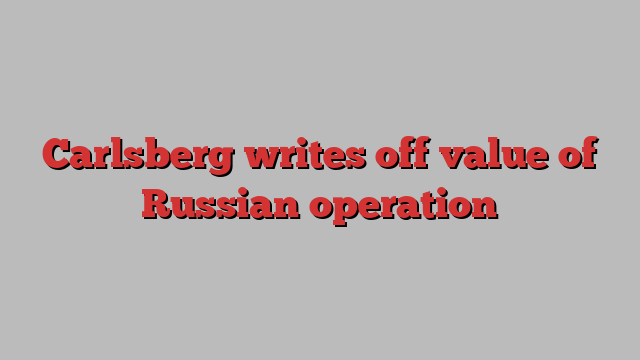
Receive free Carlsberg AS updates
We’ll send you a myFT Daily Digest email rounding up the latest Carlsberg AS news every morning.
Carlsberg has written down the entire value of its Russian business and terminated agreements allowing the local subsidiary to sell the company’s products.
The decision comes three months after the Danish brewer’s subsidiary Baltika, Russia’s biggest and most popular beer brand, was placed under state control.
In a statement, Carlsberg said following the seizure of the business, it had concluded the company could “see no path to a negotiated solution for exiting Russia”.
“We refuse to be forced into a deal on unacceptable terms, justifying the illegitimate takeover of our business in Russia,” the brewer added.
Western companies trying to sell their Russian subsidiaries have faced stringent approval processes, steep discounts and in the case of Carlsberg and French food group Danone seizure by Russian state authorities.
Baltika was transferred to Russian state control in July, a month after Carlsberg announced it had found a buyer for the business.
The preferred bidder was Arnest, a leading manufacturer of metal packaging and aerosols in Russia, said people with direct knowledge of the talks.
After the seizure of Baltika, a close friend of Vladimir Putin from the president’s native St Petersburg, Taimuraz Bolloev, was installed as Baltika’s director.
He had left most of Carlsberg’s management in place and initially indicated he was prepared to buy the company’s operations at a similar price to the one agreed with Arnest, said a person familiar with the matter.
Putin in July said Russia had nationalised Carlsberg and Danone because “the management of these companies attempted to pressure Russian citizens, their employees, threatening with possible lay-offs in case they express a certain civil stance”.
Carlsberg rejected the accusation. Baltika declined to comment.
It remains unclear why Carlsberg was singled out for punishment while its biggest competitor, Dutch brewer Heineken, in August was allowed to sell its Russian operations to Arnest at a loss of €300mn.
The nationalisations even caught Russia’s governmental commission on foreign assets by surprise after it had agreed the parameters of the potential Arnest deal with Carlsberg, including the distribution of Baltika’s dividends, the person added.
Carlsberg previously warned it would suffer a $1.4bn writedown from the sale of Baltika.
On Tuesday, it said the impairment would not affect the company’s income statement, but would be recognised “in other comprehensive income in the full-year accounts”.
As part of its deal, Heineken said it had agreed a three-year license for “some smaller regional brands”, in order to secure approval of the transaction and business continuity.
“While it took much longer than we had hoped, this transaction secures the livelihoods of our employees and allows us to exit the country in a responsible manner,” Heineken’s chief executive Dolf van den Brink said at the time.
Carlsberg said Baltika had until April to use up any existing stock and materials.
The beer company first bought a stake in Baltika in 2000. Baltika made up 9 per cent of Carlsberg’s total revenue.
The Danish brewer said it was continuing to “take all possible actions, including legal, to protect our employees, assets and operations”.